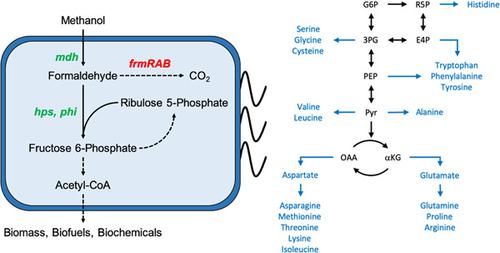当前位置:
X-MOL 学术
›
Biotechnol. Bioeng.
›
论文详情
Our official English website, www.x-mol.net, welcomes your
feedback! (Note: you will need to create a separate account there.)
Regulatory interventions improve the biosynthesis of limiting amino acids from methanol carbon to improve synthetic methylotrophy in Escherichia coli.
Biotechnology and Bioengineering ( IF 3.5 ) Pub Date : 2020-09-02 , DOI: 10.1002/bit.27549 Robert Kyle Bennett 1, 2 , Alec Agee 1, 2 , Jie R G Har 1 , Bryan von Hagel 1, 2 , Maciek R Antoniewicz 1 , Eleftherios T Papoutsakis 1, 2
Biotechnology and Bioengineering ( IF 3.5 ) Pub Date : 2020-09-02 , DOI: 10.1002/bit.27549 Robert Kyle Bennett 1, 2 , Alec Agee 1, 2 , Jie R G Har 1 , Bryan von Hagel 1, 2 , Maciek R Antoniewicz 1 , Eleftherios T Papoutsakis 1, 2
Affiliation

|
Synthetic methylotrophy aims to engineer methane and methanol utilization pathways in platform hosts like Escherichia coli for industrial bioprocessing of natural gas and biogas. While recent attempts to engineer synthetic methylotrophs have proved successful, autonomous methylotrophy, that is, the ability to utilize methane or methanol as sole carbon and energy substrates, has not yet been realized. Here, we address an important limitation of autonomous methylotrophy in E. coli: the inability of the organism to synthesize several amino acids when grown on methanol. We targeted global and local amino acid regulatory networks. Those include removal of amino acid allosteric feedback inhibition (argAH15Y, ilvAL447F, hisGE271K, leuAG462D, proBD107N, thrAS345F, trpES40F), knockouts of transcriptional repressors (ihfA, metJ); and overexpression of amino acid biosynthetic operons (hisGDCBHAFI, leuABCD, thrABC, trpEDCBA) and transcriptional regulators (crp, purR). Compared to the parent methylotrophic E. coli strain that was unable to synthesize these amino acids from methanol carbon, these strategies resulted in improved biosynthesis of limiting proteinogenic amino acids (histidine, leucine, lysine, methionine, phenylalanine, threonine, tyrosine) from methanol carbon. In several cases, improved amino acid biosynthesis from methanol carbon led to improvements in methylotrophic growth in methanol minimal medium supplemented with a small amount of yeast extract. This study addresses a key limitation currently preventing autonomous methylotrophy in E. coli and possibly other synthetic methylotrophs and provides insight as to how this limitation can be alleviated via global and local regulatory modifications.
中文翻译:

监管干预改善了限制性氨基酸从甲醇碳的生物合成,以改善大肠杆菌中的合成甲基营养。
合成甲基营养旨在设计平台宿主(如大肠杆菌)中的甲烷和甲醇利用途径,用于天然气和沼气的工业生物处理。虽然最近设计合成甲基营养生物的尝试已被证明是成功的,但自主甲基营养,即利用甲烷或甲醇作为唯一碳和能量底物的能力,尚未实现。在这里,我们解决了大肠杆菌中自主甲基营养的一个重要限制:当在甲醇上生长时,生物体无法合成几种氨基酸。我们的目标是全球和本地氨基酸监管网络。这些包括去除氨基酸变构反馈抑制(argA H15Y,ilvA L447F, hisG E271K , leuA G462D , proB D107N , thrA S345F , trpE S40F ), 转录阻遏物的敲除 ( ihfA,metJ ); 以及氨基酸生物合成操纵子(hisGDCBHAFI、leuABCD、thrABC、trpEDCBA)和转录调节子(crp、purR)的过表达。与亲本甲基营养型大肠杆菌相比对于无法从甲醇碳合成这些氨基酸的菌株,这些策略导致限制性蛋白氨基酸(组氨酸、亮氨酸、赖氨酸、甲硫氨酸、苯丙氨酸、苏氨酸、酪氨酸)从甲醇碳的生物合成得到改善。在一些情况下,甲醇碳的氨基酸生物合成的改进导致在补充有少量酵母提取物的甲醇基本培养基中甲基营养生长的改进。这项研究解决了目前阻止大肠杆菌和可能其他合成甲基营养菌中自主甲基营养的关键限制,并提供了有关如何通过全球和本地监管修改来减轻这种限制的见解。
更新日期:2020-09-02
中文翻译:

监管干预改善了限制性氨基酸从甲醇碳的生物合成,以改善大肠杆菌中的合成甲基营养。
合成甲基营养旨在设计平台宿主(如大肠杆菌)中的甲烷和甲醇利用途径,用于天然气和沼气的工业生物处理。虽然最近设计合成甲基营养生物的尝试已被证明是成功的,但自主甲基营养,即利用甲烷或甲醇作为唯一碳和能量底物的能力,尚未实现。在这里,我们解决了大肠杆菌中自主甲基营养的一个重要限制:当在甲醇上生长时,生物体无法合成几种氨基酸。我们的目标是全球和本地氨基酸监管网络。这些包括去除氨基酸变构反馈抑制(argA H15Y,ilvA L447F, hisG E271K , leuA G462D , proB D107N , thrA S345F , trpE S40F ), 转录阻遏物的敲除 ( ihfA,metJ ); 以及氨基酸生物合成操纵子(hisGDCBHAFI、leuABCD、thrABC、trpEDCBA)和转录调节子(crp、purR)的过表达。与亲本甲基营养型大肠杆菌相比对于无法从甲醇碳合成这些氨基酸的菌株,这些策略导致限制性蛋白氨基酸(组氨酸、亮氨酸、赖氨酸、甲硫氨酸、苯丙氨酸、苏氨酸、酪氨酸)从甲醇碳的生物合成得到改善。在一些情况下,甲醇碳的氨基酸生物合成的改进导致在补充有少量酵母提取物的甲醇基本培养基中甲基营养生长的改进。这项研究解决了目前阻止大肠杆菌和可能其他合成甲基营养菌中自主甲基营养的关键限制,并提供了有关如何通过全球和本地监管修改来减轻这种限制的见解。











































 京公网安备 11010802027423号
京公网安备 11010802027423号